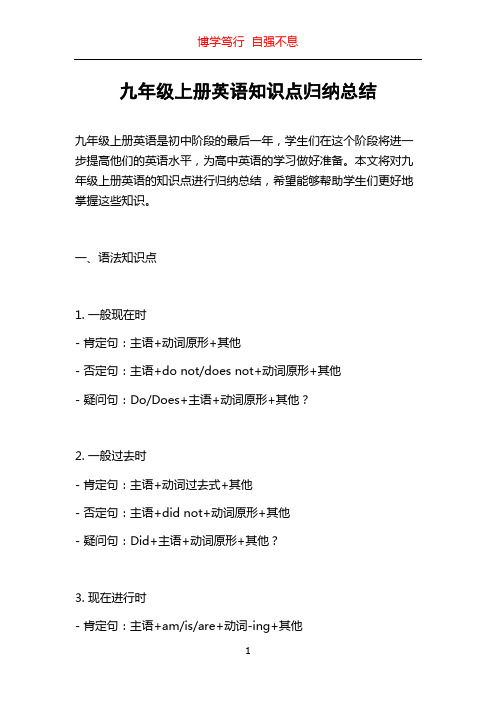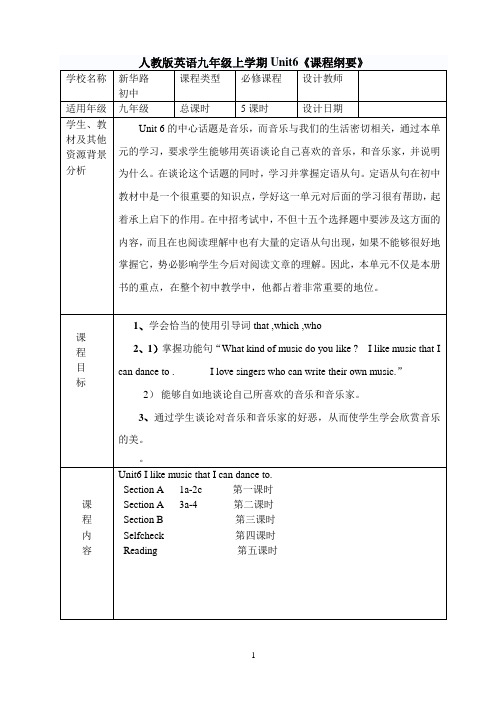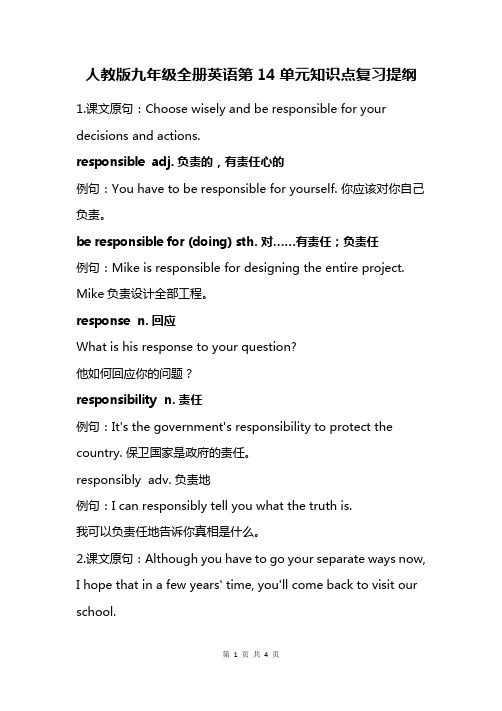九年级上册英语复习提纲新课标
九年级上册英语知识点归纳总结

九年级上册英语知识点归纳总结九年级上册英语是初中阶段的最后一年,学生们在这个阶段将进一步提高他们的英语水平,为高中英语的学习做好准备。
本文将对九年级上册英语的知识点进行归纳总结,希望能够帮助学生们更好地掌握这些知识。
一、语法知识点1. 一般现在时- 肯定句:主语+动词原形+其他- 否定句:主语+do not/does not+动词原形+其他- 疑问句:Do/Does+主语+动词原形+其他?2. 一般过去时- 肯定句:主语+动词过去式+其他- 否定句:主语+did not+动词原形+其他- 疑问句:Did+主语+动词原形+其他?3. 现在进行时- 肯定句:主语+am/is/are+动词-ing+其他- 否定句:主语+am not/is not/are not+动词-ing+其他- 疑问句:Am/Is/Are+主语+动词-ing+其他?4. 宾语从句宾语从句通常由连词that, whether, if引导。
例如:He says that he is busy.(他说他很忙。
)5. 接续动词接续动词用来连接两个句子或者短语,常见的接续动词有and, but, or, so, because等。
例如:I like swimming and playing basketball.(我喜欢游泳和打篮球。
)二、词汇知识点1. 单词拼写通过九年级上册的学习,学生们需要掌握大量的新词汇,要注意正确拼写这些单词。
可以通过多做单词拼写练习来提高拼写水平。
2. 同义词和反义词学生们需要学会使用一些同义词和反义词来丰富他们的词汇量和表达能力。
例如:big和large, hot和warm等。
3. 短语和固定搭配学生们需要掌握一些常用的短语和固定搭配,以便更加自然地表达自己的意思。
例如:in the end(最后),take care of(照顾),as soon as(一...就...)等。
三、阅读理解学生们需要培养良好的阅读习惯,提高他们的阅读理解能力。
7九年级英语上册第6单元《课程纲要》

程目Biblioteka 标1、学会恰当的使用引导词that ,which ,who
2、1)掌握功能句“What kind of music do you like ? I like music that I can dance to . I love singers who can write their own music.”
2)能够自如地谈论自己所喜欢的音乐和音乐家。
3、通过学生谈论对音乐和音乐家的好恶,从而使学生学会欣赏音乐的美。
。
课
程
内
容
Unit6 I like music that I can dance to.
Section A 1a-2c第一课时
Section A 3a-4第二课时
Section B第三课时
Selfcheck第四课时
Reading第五课时
课
程
实
施
教法学法
1、教法:采取“任务型”教学法。教师根据本节课内容,安排合适的任务,让学生在完成任务的过程中达到本节课所拟定的目标。
2、学法:任务型。让学生通过完成课前找资料、上课积极参与、讨论,课后进行巩固和迁移等任务,来达到拟定的目标。
采用任务型教学法的根据:
初中英语新课程理念中说,使用“任务型”的教学,能让学习者在实施任务的过程中有更多的机会去接触可理解的语言输入,有更多的机会以口头或笔头的形式去进行语言交际,由此产生更多的语言互动或磋商性的活动,最终将促进他们更好更快地学习语言。四、教学环节的设计。
有
效
性
评
价
学生英语学习过程的评价
⒈利用课堂学生自评、互评、和教师评价,及时反馈学习信息。
⒉利用信息交流平台针对学生的学习情况、特性与家长定期进行交流。
九年级英语上册单元重要知识点总结

九年级英语上册单元重要知识点总结九年级英语上册共有8个单元,包括Unit 1 My New Teachers、Unit 2 How Often Do You Exercise、Unit 3 I'm more outgoing than my sister、Unit 4 Don't eat in class、Unit 5 What are the shirts made of、Unit 6 I'm going to study computer science、Unit 7 Would you mind turning down themusic、Unit 8 How do you make a banana milk shake?下面对每个单元的重要知识点进行总结:Unit 1 My New Teachers1.介绍自己和他人的基本信息,包括姓名、年龄、学校、家庭成员等。
2.学习询问他人的基本信息,如What's his/her name? How old is he/she?Which school does he/she go to?等。
3.学习询问他人的职业和爱好,如What does he/she do? What are his/herhobbies?等。
4.学习表达个人的职业和爱好,如I'm a student. My hobbies are playingbasketball and listening to music.等。
Unit 2 How Often Do You Exercise1.学习询问他人的日常活动频率,如How often do you exercise? Howoften does he/she watch TV?等。
2.学习回答关于日常活动频率的问题,如I exercise three times a week.He/She watches TV every day.等。
九年级上册英语重点知识点

九年级上册英语重点知识点九年级上册英语课程是初中学习阶段的重要一步,学生们需要掌握并运用各种语法知识、词汇和句型等重点知识点。
以下是九年级上册英语的重点知识点。
一、语法知识点1. 一般现在时(Simple Present Tense):用于描述经常发生的动作、固定的事实、真理等。
2. 一般过去时(Simple Past Tense):用于描述过去发生的动作或存在的状态。
3. 现在进行时(Present Continuous Tense):用于表示现在正在进行的动作。
4. 一般将来时(Simple Future Tense):用于表示将来要发生的动作或存在的状态。
5. 一般过去进行时(Past Continuous Tense):用于表示过去某个时间点正在进行的动作。
6. 情态动词(Modal Verbs):包括can、could、may、might、shall、should、will、would、must等,用于表达能力、允许、推测、义务等。
7. 定语从句(Adjective Clause):用于修饰名词或代词的从句。
8. 倒装句(Inversion):将助动词或情态动词提到主语之前的句子结构。
9. 宾语从句(Object Clause):用于作宾语的从句。
10. 虚拟语气(Subjunctive Mood):用于表示假设、愿望、建议等。
二、词汇知识点1. 动词短语(Phrasal Verbs):由动词和副词/介词组成的短语,常用于口语和日常交流中。
2. 介词短语(Prepositional Phrases):由介词和名词短语组成的短语,用于表示时间、地点、方式等。
3. 同义词(Synonyms):意义相同或相近的词语,用于扩展词汇量。
4. 反义词(Antonyms):意义相反的词语,用于对比和理解词义。
5. 词根词缀(Word Roots and Affixes):理解词根和词缀的含义,有助于推测词义。
人教版九年级上册英语知识点归纳总结

人教版九年级上册英语知识点归纳总结Unit 1: Hello!- Greeting: Learn different ways to greet someone, such as "Hello," "Hi," and "How are you?"- Introduction: Practice introducing yourself and others using basic phrases like "My name is..." and "Nice to meet you."Unit 2: How do you spend your day?- Daily routines: Discuss how you spend your day and learn vocabulary related to daily activities.Unit 3: What are you doing for vacation?- Future plans: Talk about what you are going to do for your vacation and use phrases like "I am going to..." and "I will..."- Vacation activities: Learn vocabulary related to vacation activities such as swimming, hiking, and sightseeing.Unit 4: I used to be afraid of the dark.- Past experiences: Discuss past experiences and use the structure "used to + verb" to talk about things that happened in the past but are not happening now.Unit 5: What does he look like?- Physical appearances: Describe people's physical appearances using adjectives such as tall, short, and thin.- Personal traits: Talk about people's personalities and use adjectives like friendly, funny, and smart.Unit 6: I'm more outgoing than my sister.- Invitations: Learn to invite people to events and respond to invitations using phrases like "Can you...," "I would love to," and "I'm sorry, but..."- Party preparations: Discuss party preparations and learn vocabulary related to organizing an event.Unit 8: What's the best movie theater?- Preferences: Talk about preferences and express opinions using phrases like "In my opinion," "I think," and "I like... better."Unit 9: How was your weekend?- Past events: Discuss past events and use the simple past tense to talk about activities that happened over the weekend.- Weekend activities: Share weekend activities and learn vocabulary related to leisure and free time.Unit 10: It's a nice day, isn't it?- Weather expressions: Learn vocabulary related to weather conditions and use weather expressions like "It's sunny," "It's raining," and "It's snowing."- Small talk: Practice making small talk and engaging in conversations about the weather.Unit 11: What's the matter with you?- Giving advice: Give advice to someone who is not feeling well using phrases like "You should..." and "Why don't you...?"Unit 12: How do you make a banana milkshake?- Recipes: Learn how to write and follow a recipe using imperative verbs and measurement vocabulary.- Cooking instructions: Share cooking instructions and describe the process of making a specific dish.以上是人教版九年级上册英语知识点的归纳总结。
人教版九年级全册英语第14单元知识点复习提纲

人教版九年级全册英语第14单元知识点复习提纲1.课文原句:Choose wisely and be responsible for your decisions and actions.
responsible adj. 负责的,有责任心的
例句:You have to be responsible for yourself. 你应该对你自己负责。
be responsible for (doing) sth. 对……有责任;负责任
例句:Mike is responsible for designing the entire project. Mike负责设计全部工程。
response n. 回应
What is his response to your question?
他如何回应你的问题?
responsibility n. 责任
例句:It's the government's responsibility to protect the country. 保卫国家是政府的责任。
responsibly adv. 负责地
例句:I can responsibly tell you what the truth is.
我可以负责任地告诉你真相是什么。
2.课文原句:Although you have to go your separate ways now,
I hope that in a few years' time, you'll come back to visit our school.
第1页共4页。
人教版九年级英语上册各单元知识点归纳总结
人教版九年级英语上册全册各单元必考知识点目录Unit1 知识要点梳理 (4)【重点短语】 (4)【考点详解】 (5)Unit2 知识要点梳理 (10)【短语归纳】 (10)【考点详解】 (11)【重点语法】 (11)Unit3 知识要点梳理 (14)【重要短语】 (14)【考点详解】 (14)Unit4 知识要点梳理 (18)【重点短语】 (18)【考点详解】 (18)【重点语法】 (22)Unit5 知识要点梳理 (24)【重点短语】 (24)【考点详解】 (24)【重点语法】 (27)Unit6 知识要点梳理 (30)【重点短语】 (30)【考点详解】 (30)【重点语法】 (33)Unit1 知识要点梳理【重点短语】1. have conversation with sb. 同某人谈话2. too…to… 太……而不能3. the secret to… ……的秘诀4. be afraid of doing sth./ be afraid to do sth. 害怕做某事5. look up 查阅6. repeat out loud 大声跟读7. make mistakes in 在……方面犯错误8. connect ……with… 把……和……连接/联系起来9. get bored 感到厌烦10. be stressed out 焦虑不安的11. pay attention to 注意;关注12. depend on 取决于;依靠13. the ability to do sth.. 做某事的能力【考点详解】1. by + doing 通过……方式(by是介词,后面要跟动名词,也就是动词的ing 形式)2. talk about 谈论,议论,讨论The students often talk about movie after class. 学生们常常在课后讨论电影。
talk to sb= talk with sb 与某人说话3. 提建议的句子:①What/ how about +doing sth.? 做…怎么样?(about后面要用动词的ing形式,这一点考试考的比较多)如:What/ How about going shopping?②Why don't you + do sth.? 你为什么不做…?如:Why don't you go shopping?③Why not + do sth. ? 为什么不做…?如:Why not go shopping?④Let's + do sth. 让我们做…...吧。
人教版九年级英语上册知识点归纳
人教版九年级英语全册知识点归纳及习题〔最新〕Unit 1 How can we bee good learners?短语总结:1. good learners优秀的学习者2. work with friends 和朋友一起学习3.study for a test 备考4.have conversations with 与……交谈5.speaking skills 口语技巧6.a little 有点儿7.at first 起初起先8.the secret to......,.......的秘诀9.because of 因为10.as well 也11.look up (在词典中等)查阅;抬头看12.so that 以便,为了13.the meaning of ……的意思14.make mistakes 犯错误15.talk to 交谈16.depend on 依靠依赖17.in mon 共有的18.pay attention to 注意关注19.connect ……with ……把……联系。
20.for example 例如21.think about 考虑22.even if 即使尽管纵容23.look for 寻找24.worry about 担忧担忧25.make word cards 制作单词卡片26.ask the teacher for help 向教师求助27.read aloud 大声读28.spoken english 英语口语29.give a report 作报告30.word by word 一字一字地31.so……that 如此……以至于32.fall in love with 爱上33.something interesting 有趣的事情34.take notes 记笔记35.how often 多久一次36.a lot of 许多37.the ability to do sth. 做某事的能力38.learning habits 学习习惯39.be interested in 对……感兴趣40.get bored 感到无聊41.be good at 在……方面擅长42.be afraid of 害怕43.each other 彼此互相44.instead of 代替而不是二.用法集萃1.by doing sth 通过做某事2.it +be+adj+to do sth 做某事是……的3.finish doing sth 完成某事4.what about doing sth?做某事怎么样?5.try to do sth 尽力做某事6.the +比拟近,the+比拟近越……,就越……7.find it+adj+to do sth 发现做某事8.be afraid of doing sth 害怕做某事9.help sb (to) do sth 帮助某人做某事10.practice doing sth 练习做某事11.keep doing sth 一直做某事12.be afraid to do sth 害怕做某事13.begin to do sth 开场做某事14.want to do sth 想要做某事15.need to do sth 需要做某事16.remember to do sth 记得做某事17.shoot 射〔射着,射死等表结果〕18.shoot at〔瞄准〕射Unit1 检测题一.单项选择1.—_______ do you study English? —By listening to tapes.A. HowB. WhereC. WhenD. Why2.You can improve your English practicing more. A.by B.with C.ofD.in3. Why not practice your _________English in _________ English-speaking country?A. speaking, aB. speaking, anC. spoken, an4. ________conversations with others is one of the secrets to _________a successful learner.A. Practice, beeB. Practice, beingC. Practicing, being5 ---There’re a few new words in the article? ---What about _________in your dictionary?A. looking it upB. looking up itC. looking them up6. We’ll go out to play _________ it rains tomorrow. A. so B. unless C. because7. Can you ________which is the right answer to the question? A. look for B. find C. find out8. Jenny used to be afraid to ________in class, so she always ________nothing.A. speak, talkedB. speak, saidC. say, spoke9.— Why not listen to BBC news to improve your listening skills?—It’s ________ difficult _______ I can’t follow. A. too; to B. so; that C. such; that10. A good learner often thinks about ________he needs to practice more.A. thatB. whatC. how11.--I’m going to listen _______the tape. --OK. Remember to listen ________the key words.A. to, toB. to ,forC. for, to12. ________or not you can learn well depends on your learning habits.A. IfB. WeatherC. Whether13. I have finished _________my report. May I start to learn ________the guitar?A. writing, playingB. writing, to playC. to write, playing14. ---I often make mistakes _______grammar. ---Why not ask your teacher _______help?A. in, toB. in, forC. at, to15. _________write down the new words in your notebook?A. Would you likeB. How aboutC. Could you please16. ---Jack used to have ________writing practice. ---Yes, and he had learned _________.A. a lot of, a lot ofB. a lot of, a lotC. a lot, a lot of17. The more careful you are, ________mistakes you’ll make.A. fewer B. the fewer C. the less18. Good learners aren’t afraid _______mistakes. Instead, they learn ________mistakes.A. of making, inB. to make, fromC. to make, in19. For the first time, pay attention _________quickly to get the main ideas.A. to readB. readingC. to reading20.I discovered that listening tois the secret language learning.A.something intresting, toB.interesting something, toC.something interested, ofD.interested something of21.Jenny found it very easyEnglish well. A.learning B.to learn C.learnD.learned22. He_____ with the girl with golden hair and will soon get married____ her.A. falls in love; toB. is in love; toC. loves; withD. loves; to23. My father thinks _____ is a great way to learn English.A. study grammar.B. I study grammar.C. studying grammar.D. studies grammar24 Why not ___ your teacher for help when you can’t finish _____ it by yourself?A. ask; writeB. to ask; writingC. ask; writingD. asking; write25. I wonder if I can learn English well.— . All things are difficult before they are easy.A. I am afraid soB. You’re slowC. It takes timeD. It’s a piece of cake26 You’ll find _____________ easy to learn it well. A. that B. its C. it D. this27. –I don’t have a partner to practice English ______________.---Why not join an English language club to practice _______________?A. /; speakingB. with; to speakC. /; to speakD. with; speaking28. ---She hardly makes mistakes _________English grammar.---No, it seems that she was born ________the ability to learn languages.A. in, withB. with, inC. in, inD. with, with二用所给单词的适当形式填空。
九年级上册英语知识点归纳人教版
九年级上册英语知识点归纳人教版导语:九年级上册英语知识点归纳人教版,是对九年级上学期英语所涉及的主要知识点进行梳理和总结。
通过系统地整理和分类,能够帮助我们更好地掌握和理解相关知识,为提高英语学习效果提供了重要的参考。
一、单词与词组1. 人称代词:包括主格形式和宾格形式的使用以及和动词的搭配2. 冠词:不定冠词和定冠词的用法区别3. 动词时态:包括一般现在时、一般过去时和将来时的用法4. 形容词和副词:比较级和最高级的构成和用法5. 介词短语:表示时间、地点和方向的常用介词及其搭配6. 情态动词:can, could, may, might, must等情态动词的用法7. 短语动词:常见的短语动词及其搭配8. 数词:基数词和序数词的用法9. 日常用语:问候用语、感谢用语、道歉用语等二、语法结构1. 句子成分:主语、谓语、宾语、定语和状语的辨析2. 并列句和复合句:并列句和复合句的构成和连接词的用法3. 直接引语和间接引语:直接引语和间接引语的变化和应用4. 虚拟语气:虚拟语气的用法及其表达方式5. 名词性从句:宾语从句、主语从句、表语从句和同位语从句的用法6. 状语从句:时间状语从句、地点状语从句、原因状语从句、条件状语从句和结果状语从句的连接词和构成三、阅读理解1. 阅读策略:快速阅读、略读和深度阅读的技巧和方法2. 阅读题型:根据文章内容回答问题、归纳文章主旨和作者观点等题型的解题技巧3. 阅读材料:包括记叙文、议论文、说明文和应用文等不同类型的阅读材料四、写作表达1. 书面表达:书信、便条、日记、通知、邀请函等书面表达形式的写作技巧2. 口头表达:根据具体情境进行口头表达的能力训练3. 写作技巧:逻辑清晰、语言流畅、表达准确和适当使用修辞手法等写作技巧的培养结语:九年级上册英语知识点归纳人教版,从单词与词组、语法结构、阅读理解和写作表达四个方面全面总结了九年级上学期英语的主要知识点。
通过系统地学习和掌握这些知识,我们可以更好地理解和运用英语,为提高英语学习效果奠定坚实的基础。
人教版(新目标)初中英语九年级上册Unit5知识点汇总
chopsticks [ˌtʃɔpstiks] n. 筷子 .coin [kɔin] n. 硬币fork [fɔ:k] n. 餐叉,叉子.blouse [blauz] n.(女士)短上衣;衬衫.sliver [silvə] n. 银,银器;adj.银色的.glass [glas] n .玻璃cotton ['kɒtn] ['kɑ:tn] n. 棉;棉花.steel [sti:l] n. 钢;钢铁.fair [feə(r)] [fer] n.展览会;交易会 adj.公平的environmental [ɪnˌvaɪrənˈmentl] adj.自然环境的;有关环境的grass [ɡrɑ:s] [ɡræs] n. 草;草地leaf [li:f] n.(pl. leaves [li:vz])叶,叶子produce [prə'dju:s] v. 生产;制造;出产 .widely [ˈwaidli] adv. 广泛地;普遍地 .be known for 因……闻名;为人知晓process [prəuses] v. 加工;处理;过程.Park 包装;装箱product [ˈprɒdʌkt][ˈprɑ:dʌkt] n. 产品;制品France [fra:ns], [fræns] 法国 .no matter 不论;无论 .local [ˈləukl] adj. 当地的;本地的 .brand [brænd] n. 品牌;牌子avoid[əˈvɔid] v. 避免;回避 . handbag[ˈhændbæg] n. 小手提包mobile [ˈməubail] adj.可移动的;非固定的everyday ['evrideɪ] adj. 每天的;日常的boss[bɒs] [bɔ:s] n. 老板;上司Germany [ˈdʒə:(r)məni] n. 德国 .surface [sə:(r)fis] n. 表面;表层 .material [məˈtiəriəl] n. 材料;原料 .traffic [ˈtræfɪk] n. 交通;路上行驶的车辆postman [ˈpəustmən] n. 邮递员. cap [kæp] n(尤指有帽舌的)帽子glove [glʌv] n(分手指的)手套 .international [ˌintə(r) ˈnæʃnəl] adj. 国际的competitor [kəmˈpetitə(r)] n. 参赛者;竞争者its[its] adj. 它的form [fɔ:(r)m] n. 形式;类型clay [klei] n. 黏土;陶土celebration [ˌselɪˈbreɪʃn] n. 庆典;庆祝活动balloon [bəˈlu:n] n. 气球 .paper cutting 剪纸scissors [ˈsizə(r)z] n. (pl.) 剪刀lively [ˈlaivli] adj. 生气勃勃的;(色彩)鲜艳的fairy[ˈfeəri] [ˈferi] tale [teil] n 童话故事historical[hɪˈstɒrɪkl] adj.(有关)历史的heat [hi:t] n. 热;高温 v. 加热,变热polish[ˈpɒlɪʃ][ˈpɑ:lɪʃ] v. 磨光;修改;润色complete[kəmˈpli:t] v. 完成Korea [kəˈri:ə] 朝鲜;韩国Switzerland [switsə(r)lənd] 瑞士San Francisco [ˌsæn frənˈsiskəu] 圣弗朗西斯科(旧金山,美国城市)Marcus [ˈmɑ:kəs] n. 马库斯(男子名)Pam [pæm] 帕姆(女名)02 U n i t 5 知识梳理Unit 5 What are the shirts made of?【重点短语】1.be made of 由...制成的(表示制成成品后,仍可看出原材料是什么)2.be made from 由...制成的(在成品中已无法辨认原材料)3.b e known for 以.......闻名4.b e used for 被用于......5.n o matter 不论;无论6.be covered with 用... 覆盖7.as far as I know 据我所知8.by hand 用手9.b e good for 对……有益10.on the last friday of each month最后一个星期五11.be good at 擅长12.make high-technology products 制造高科技产品13.the earth’s surface地球表面14.many different kinds of 许多不同种类的15.fly a kite 放风筝16.such as 例如17.according to 根据按照18.ask for help 请求帮助19.a symbol of ……的象征20.put…on… 把……放在……上21.be used for 被用于做……22.good luck 好运23.at a very high heat 在高温下24.be made in 在……制造的25.befamous for 以……著名26.on the sides of mountains 在山腰上27.traffic accident 交通事故28.a kite festival 风筝节29.be from 来自30.turn ……into ……把……变成……【重点句型】1.What are the shirts made of?衬衫是由什么制成的?2.It was made in Thailand.它是在泰国制造的。
- 1、下载文档前请自行甄别文档内容的完整性,平台不提供额外的编辑、内容补充、找答案等附加服务。
- 2、"仅部分预览"的文档,不可在线预览部分如存在完整性等问题,可反馈申请退款(可完整预览的文档不适用该条件!)。
- 3、如文档侵犯您的权益,请联系客服反馈,我们会尽快为您处理(人工客服工作时间:9:00-18:30)。
九年级上册英语复习提纲 Unit 1 一、重点词组: 1.by making flashcards 通过做单词抽认卡 2. ask„for help 向某人求助 3.read aloud 朗读 4.that way (=in that way) 通过那种方式 5.improve my speaking skills 提高我的会话技巧 6.for example (=for instance)例如 7.have fun 玩得高兴 8.have conversations with friends 与朋友对话 9.get excited 高兴,激动 10.end up speaking in Chinese 以说汉语结束对话 11.do a survey about„ 做有关„的调查 12.keep an English notebook 记英语笔记 13.spoken English (= oral English) 英语口语 14.make mistakes 犯错误 15.get the pronunciation right 使发音准确 16.practise speaking English 练习说英语 17.first of all 首先 18.begin with 以„开始 19.later on 随后 20.in class在课堂上 21.laught at 嘲笑 22.take notes 记笔记 23.enjoy doing 喜欢干„ 24.write down 写下,记下 25.look up (v + adv) 查找,查询 26.native speakers 说本族话的人 27.make up 编造,虚构,化妆,打扮 28.around the world 全世界 29.deal with 对待,处理,解决 30.worry about (be worried about) 担心,担忧 31.be angry with 生某人的气 32.stay angry 生气 33.go by 消逝 34. regard„as„ 把„当做„ 35.complain about/of 抱怨 36. change„into„ 把„变成„ (= turn into) 37.with the help of 在„的帮助下 38. compare„to (with)„ 把„和„作比较 39.think of (think about) 想起,想到 40.physical problems身体上的问题 41.break off 中断,突然终止 42. not„at all 根本不,全然不
二、重点句子: 1. How do you study for a test? 你怎样为考试做准备? 2. I have learned a lot that way. 用那种方法,我已经学到了很多东西。 3.It’s too hard to understand the voice. 听懂那些声音太难了。 4.Memorizing the words of pop songs also helped a little.记流行歌曲的词也起作用。 5. Wei Ming feels differently. 卫明有不同的感受。 6.He finds watching movies frustrating. 他觉得看电影让人感到沮丧. 7.She added that having conversations with friends was not helpful at all. 她又说和朋友对话根本没用。 8.I don’t have a partner to practice English with. 我没有搭档一起练习英语。 9.Later on, I realized that it doesn’t matter if you don’t understand every word. 随后,我认识到听不懂每个词并没有关系。 10.It’s amazing how much this helped. 我惊异于这些方法竟如此有用。 11.My teacher is very impressed. 给老师留下了深刻的印象。 12.She had trouble making complete sentences. 她很难造出完整的句子。 13.What do you think you are doing? 你在做什么? 14.Most people speak English as a second language. 英语对于大多数人来说是第二语言。 15.How do we deal with our problem? 我们怎样处理我们的问题? 16.It is our duty to try our best to deal with each challenge in our education with the help of our teachers. 在老师的帮助下尽我们最大的努力来应对挑战是我们的责任。 17.He can’t walk or even speak.他无法走路,甚至无法说话
Unit 2
一、重点词组:
1. be more interested in 对„更感兴趣. 2. on the swim team 游泳队的队员. 3. be terrified of 害怕. 4. gym class 体操课. 5. worry about. 担心. 6. all the time 一直, 总是 7. chat with 与„闲聊 8. hardly ever 几乎从不 9. walk to school = go to school on foot take the bus to school = go to school by bus 步行去学校 10. as well as 不仅„而且 11. get into trouble 遇到麻烦 12. make a decision 做出决定 13. to one’s surprise 使某人吃惊的是 14. take pride in 为„感到骄傲 15. pay attention to 留心, 注意 16. consist of 由„组成/构成. be made up of 由„组成/构成. 17. instead of 代替, 而不是 18. in the end 最后, 终于 19. play the piano 弹钢琴
二、重点句子: 1.I used to be afraid of the dark. 我以前害怕黑暗. 2.I go to sleep with my bedroom light on. 我开着卧室的灯睡觉. 3.I used to spend a lot of time playing games with my friends. 以前我常常花很多时间和我的朋友们玩游戏. 4.I hardly ever have time for concerts. 我几乎没有时间去听音乐会. 5.My life has changed a lot in the last few years. 6.It will make you stressed out. 那会使你紧张的. 7.It seems that Yu Mei has changed a lot. 玉梅似乎变化很大.
Unit 3 一、重点词组: 1. be allowed to do sth 被允许干„ allow sb to do sth 允许某人干„ allow doing sth 允许干„ 2.sixteen-year-olds = sixteen-year-old boys and girls 16岁的孩子 3. part-time jobs 兼职工作 4. a driver’s license 驾照 5. on weekends 在周末 6. at that age 在那个年龄段 7. on school nights 在上学期间的每个晚上 8. stay up 熬夜 9. clean up (相当与及物动词) 清扫 10. fail (in) a test 考试不及格 11. take the test 参加考试 12. the other day 前几天 13. all my classmates 我所有的同学 14. concentrate on 全神贯注于 15. be good for 对„有益 16. in groups 成群的,按组的 17. get noisy 吵闹(系表结构) 18. learn from 向某人学习 19. at present 目前,现在 20. have an opportunity to do sth 有做„的机会 21.English-English dictionary 英英词典 22. at least 至少 23.eight hours’ sleep a night 每晚8小时的睡眠 24. an old people’s home 敬老院 25. take time to do sth 花费时间干„ 26. primary schools 小学 27. have„off 放假,休息 28. reply to 回答,答复 29. get in the way of 妨碍 30. a professional athlete 职业运动员 31. achieve one’s dreams 实现梦想 32. think about 思考,考虑 33. in the end 最后,终于 34. be serious about 对„热忠/极感兴趣 35. spend„on + n. spend „(in) + v-ing 在„上花费时间/金钱 36. care about 关心,担心,在乎 37. agree with 同意„
Unit 4
二、重点句子: 1. I don’t think twelve-year-olds should be allowed to get their ears pierced. 我认为不应该允许12岁的孩子穿耳孔. 2.They talk instead of doing homework. 他们聊天而不是做作业. 3.He is allowed to stay up until 11:00 pm. 允许他们熬到晚上11点. 4.We should be allowed to take time to do things like that more often. 我们应该被允许更加经常的花些时间多做这类事情. 5.What school rules do you think should be changed? 你认为学校的哪些制
